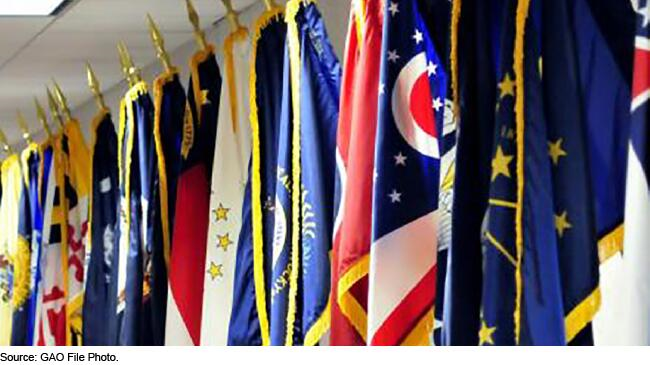Federalism: Opportunities Exist to Improve Coordination and Consultation with State and Local Governments
Fast Facts
Federal programs in education, health care, and other areas are often implemented through a complex partnership between federal, state, and local governments. An Executive Order on federalism requires federal agencies to consult with state and local officials when formulating policy that affects them.
State and local associations said that coordinating with agencies could be challenging—e.g., intergovernmental affairs contacts were hard to find.
Guidance from the Office of Management and Budget calls for agencies to designate a federalism official, but the OMB didn't ensure this happened. We recommended ensuring compliance with OMB guidance.

Highlights
What GAO Found
Federal agencies' intergovernmental affairs activities advance agency objectives that require coordination with state and local governments. Most of the 24 Chief Financial Officers (CFO) Act agencies GAO surveyed reported undertaking similar information-sharing and coordination activities, such as serving as liaisons, conducting outreach, and hosting and attending events.
The agencies GAO surveyed also reported taking varied approaches to structuring their intergovernmental affairs operations to conduct these activities. Of the 20 agencies with agency-wide intergovernmental affairs offices, half focused on intergovernmental affairs as their sole function while the other half included multiple functions, such as congressional or legislative affairs.
How Agencies Organized Their Intergovernmental Affairs Operations

Most agencies also reported that intergovernmental affairs activities and responsibilities were dispersed across their agencies. Regional and program offices perform intergovernmental affairs functions at some agencies, while others have an agency-wide office for them. Responsibilities for consulting with state and local governments under Executive Order (E.O.) 13132 also varied. The order requires that each federal agency designate an official to implement the order. Fourteen agencies reported having such an official; 10 did not report having one.
Representatives from state and local associations GAO interviewed reported interacting with federal agency intergovernmental affairs offices for outreach and information-sharing purposes. They also cited coordination and consultation challenges, such as difficulty identifying intergovernmental affairs contacts, limited federal agency knowledge of state and local government, and inconsistent consultation on proposed regulations.
The Office of Management and Budget (OMB) has primary responsibility for implementing E.O. 13132 and related implementation guidance, including a requirement for the designation of a federalism official. However, OMB could not identify any oversight steps it had taken to ensure federal agencies' designation of a federalism official consistent with its guidance for implementation of the executive order. Taking steps to ensure federal agencies' designation of a federalism official could help ensure that agencies have an accountable process in place for appropriately consulting with state and local governments.
Why GAO Did This Study
Federal programs fulfilling national goals in education, health care, transportation infrastructure, and homeland security, among other issues, are implemented through a complex partnership between federal, state, and local governments. E.O. 13132, Federalism, outlines principles and criteria to guide the formulation and implementation of policies and the appropriate division of responsibilities between levels of government.
GAO was asked to review intergovernmental affairs activities at executive branch agencies. This report (1) identifies intergovernmental affairs offices' key responsibilities and activities at selected federal agencies and how these offices are organized, and (2) assesses state and local government officials' interaction with intergovernmental affairs offices, including their reported strengths and challenges. GAO examined relevant policies and executive orders and surveyed officials from the 24 CFO Act agencies. GAO also interviewed a nongeneralizable sample of individuals from 10 associations representing state and local government officials.
Recommendations
GAO is recommending that OMB ensure that federal agencies implement its guidance on agency adherence to E.O. 13132 requirements, particularly related to designating a federalism official. OMB neither agreed nor disagreed with the recommendation.
Recommendations for Executive Action
| Agency Affected | Recommendation | Status |
|---|---|---|
| Office of Management and Budget | The Director of OMB should take steps to ensure that federal agencies implement its guidance on agency adherence to E.O. 13132 requirements, particularly related to designating a federalism official. (Recommendation 1) |
In a letter to GAO dated June 29, 2021, OMB stated that to facilitate increased agency compliance with the requirement to designate a federalism official under E.O. 13132, OMB will take steps to ensure agencies are adhering to this requirement. The letter further stated that, among other things, OMB will provide a written notice to the agencies reminding them of this obligation. On September 12, 2024, OMB provided documentation showing that, on May 11, 2022, OMB sent a communication to all federal agencies noted in GAO-21-560 reminding them of GAO's recommendation and their Federalism responsibilities pursuant to Executive Order 13132. The communication further stated that, for all policies with federalism implications, as defined in Executive Order 13132, the goal of this federalism official is to ensure meaningful and timely intergovernmental consultations.
|
